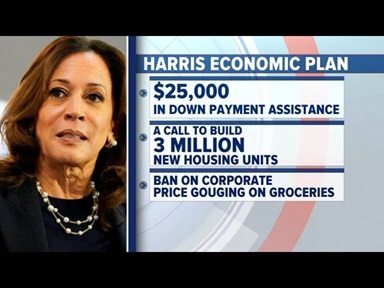Dear Commons Community,
Kamala Harris laid out an economic plan yesterday including a proposal for a federal ban on what she called price gouging on groceries, as well as $25,000 in down payment help for certain first-time home buyers and tax incentives for builders of starter homes. She also spoke at length about lowering drug costs and criticized the platform of her opponent, Donald Trump.
Here’s a look at some of her proposals and claims courtesy of The Associated Press.
The impact of Trump’s proposed tariffs
HARRIS: Trump “wants to impose what is in effect, a national sales tax on everyday products and basic necessities that we import from other countries. … And you know, economists have done the math. Donald Trump’s plan would cost a typical family $3,900 a year.”
THE FACTS: Harris was referring to Trump’s proposal to impose a tariff of 10% to 20% on all imports — he has mentioned both figures — and up to 60% on imports from China.
Most economists do expect it would raise prices on many goods. The Tax Policy Center, a joint project of the Urban Institute and the Brookings Institution, estimates it would reduce average incomes in the top 60% of earners by 1.8%. And the Center for American Progress Action Fund, a progressive advocacy group, has calculated that the higher tariffs would cost households an extra $3,900 a year. However, Trump has said the tariff revenue could be used to cut other taxes, which would reduce the overall cost of the policy.
Lowering the cost of insulin and prescription drugs
HARRIS: “I’ll lower the cost of insulin and prescription drugs for everyone.”
THE FACTS: Harris made this promise while referencing the Inflation Reduction Act of 2022, which allows Medicare to negotiate medication costs directly with drug companies. While it is difficult to predict whether she will be able to keep it, especially without more details, recent policy can provide some clues.
For example, the White House announced Thursday that it had inked deals with manufacturers that could save taxpayers billions of dollars by knocking down the list prices for 10 of Medicare’s costliest drugs. However, there are a number of factors — from discounts to the coinsurance or copays for the person’s Medicare drug plan — that determine the final price a person pays when they pick up the drugs at their pharmacy.
Powerful drug companies unsuccessfully tried to file lawsuits to stop these negotiations. They ended up engaging in talks and executives hinted in recent weeks during earnings calls that they don’t expect the new Medicare drug prices to impact their bottom line. However, the manufacturers have warned that the Inflation Reduction Act could drive up prices for consumers in other areas.
Both the Trump and Biden administrations achieved $35 insulin copay caps for certain Medicare recipients. Biden’s caps have a wider reach, as they apply to all insulin products covered by any Medicare Part D or Part B plan, according to health policy research nonprofit KFF. Trump’s applied only to some insulin products covered by a voluntary subset of Part D plans.
A federal ban on grocery ‘price gouging’
HARRIS: “As president, I will take on the high costs that matter most to most Americans. … And I will work to pass the first ever federal ban on price gouging on food.”
THE FACTS: While grocery prices are 25% higher than they were before the pandemic four-and-a-half years ago, they have settled down recently and it’s not clear that much price gouging is now going on.
In the past 12 months, grocery prices on average are up just 1.1%, comparable to pre-pandemic increases. Also, prices for most goods and services, in general, don’t fall significantly except in steep, painful recessions. Instead, most economists expect that wages will rise enough so that Americans can adjust to higher costs. Still, prices remain higher overall than they were just a couple of years ago.
Addressing housing shortages and helping home buyers
HARRIS: “And by the end of my first term, we will end America’s housing shortage by building 3 million new homes and rentals. … While we work on the housing shortage, my administration will provide first time homebuyers with $25,000 to help with the down payment on a new home.”
THE FACTS: These promises could end up working at cross-purposes. By helping more Americans afford homes, the Harris proposal to subsidize down payments would almost certainly increase demand, at a time when estimates of the U.S. housing shortage already range from 3 million to as high as 7 million.
Harris’ proposal to provide tax incentives to builders to encourage more home and apartment construction would address that concern, but there are many reasons experts cite for the housing shortage, including restrictive zoning laws, higher costs for building materials, and even shortages of construction workers, which tax incentives can’t address.
Harris is also promising to cut red tape that restricts new building, but that is mostly a state and local concern, and many localities are already moving to make it easier build homes.
Much of what Harris proposes makes sense whether they are ever implemented depends largely upon which political party controls the US Congress if she is elected.
Tony



